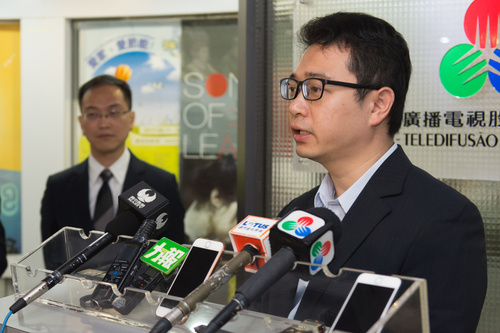 The Chairman of the Electoral Affairs Commission for the Legislative Assembly Election, Mr Tong Hio Fong, speaks to reporters.
The Chairman of the Electoral Affairs Commission for the Legislative Assembly Election, Mr Tong Hio Fong, speaks to reporters.
The Electoral Affairs Commission for the Legislative Assembly Election today urged qualified voters to exercise on election day their right to vote and thus fulfil their civic duty.
An aggregate of 42 polling stations – respectively serving either the direct or indirect polling process – will be open for voting from 9am to 9pm on Sunday (17 September), said the Commission Chairman, Mr Tong Hio Fong.
Mr Tong issued the voting reminder to the public during a radio phone-in programme today. Commission members Mr Kou Peng Kuan and Mr Chan Chi Ping, and Assistant Commissioner of the Commission Against Corruption (CCAC), Mr Lam Chi Long, also took part in the broadcast in order to exchange with radio listeners views regarding the election process.
Voters are required to show a valid Macao identity card in order to receive a ballot paper at their designated polling station. Polling stations were typically busiest at opening time, said Mr Tong, and he suggested voters to cast their ballot during non-peak hours, in order not to spend long time waiting.
Voters who have yet to receive a poll notice, can obtain details of their polling station via either: a telephone hotline (+853 2891 7917); or by visiting the Election Information Centre at the Public Administration Building; or by visiting any of the self-service kiosks of the Public Administration and Civil Service Bureau or of the Identification Services Bureau.
Any voter who had lost his or her identity card could request on Sunday a certificate from the Identification Services Bureau (located on the 20th floor of the China Plaza Building).
Speaking to the press after the radio programme, Mr Tong said the Commission would submit a post-election report to the Chief Executive offering an analysis and overview of this year’s poll process. Suggestions regarding any possible amendment to the Legislative Assembly Election Law might be also included in the report.
For example, the law did not currently envisage the legal responsibilities associated with any individual candidate and/or election team that might upload sponsored content with election-related material to a social media site such as Facebook, whereas the law did currently encompass such responsibilities as they applied to companies managing such social media sites.
In addition, Mr Tong said the Commission had received a complaint that one election candidate had failed to follow through on a pledge of allegiance to the Macao Special Administrative Region (SAR). All persons seeking to join an election ticket were required to sign a letter declaring to uphold the Basic Law and pledge allegiance to the Macao SAR, he stated.
To analyse such a complaint, the Commission would need further objective evidence to consider whether the candidate concerned might have committed a violation of law. Mr Tong said such analysis would rely on evidence being gathered and on the legislative intent of relevant legislation: in particular, whether relevant legislation covered alleged behaviour by the candidate concerned, said to have occurred prior to the campaign.
The CCAC’s Mr Lam noted the body had made approximately 2,900 inspection visits – starting in March and up to today – involving community associations directly or indirectly connected to election teams. The tally included some 1,900 inspections made to restaurants and further 1,000 regarding activities relating to subsidy distribution and relating to organisation of trips by associations.
Mr Lam said the CCAC would step up its effort to monitor the activity of local associations and would investigate any election-day suspected irregularity.
View gallery


